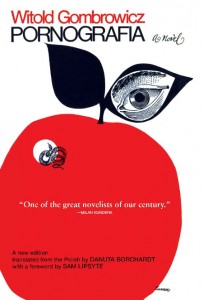World Books: ‘Pornografia’ translation earns an award
By Bill Marx
 In English, Polish novelist, playwright, short story writer, and brazen, metaphysical gadfly Witold Gombrowicz remains under appreciated, a modernist who was never pulled into the highbrow bandwagon. Part of that neglect is thanks to bad translations that, in some cases, bowdlerized the Polish text or were translated from a French version of the original. One of the neglected issues regarding translation is how much harm mediocre translations do—on occasion they sabotage literary genius, imprisoning the writer’s prose in a false image that hardens over the years. By the time a new, juster translation comes along it is too late. Let’s hope that doesn’t hold true for Gombrowicz.
In English, Polish novelist, playwright, short story writer, and brazen, metaphysical gadfly Witold Gombrowicz remains under appreciated, a modernist who was never pulled into the highbrow bandwagon. Part of that neglect is thanks to bad translations that, in some cases, bowdlerized the Polish text or were translated from a French version of the original. One of the neglected issues regarding translation is how much harm mediocre translations do—on occasion they sabotage literary genius, imprisoning the writer’s prose in a false image that hardens over the years. By the time a new, juster translation comes along it is too late. Let’s hope that doesn’t hold true for Gombrowicz.
Danuta Borchardt has been working to turn Gombrowicz’s fortunes in English around, re-translating three of his novels, including his masterpiece Ferdydurke, for which she won a National Translation Award. (My personal favorites are the novel Cosmos and his speculative Diaries.) Her latest Gombrowicz translation is of his 1966 novel Pornografia, which has now won a 2010 Found in Translation Award. Set in 1939 in the Polish countryside, the black comedy revolves around two aging “thinkers” who play mind games with a pair of teens, an attempt at vampirish exploitation that eventually turns obsessive and ugly. The paperback edition of Pornografia will be released this coming October.

Gombrowicz translator Danuta Borchardt
In a World Books podcast, I spoke to Borchardt about the challenges of putting Gombrowciz into English, the politics of translation (Susan Sontag had veto power over issues raised by the Ferdydurke translation), and why Gombrowicz should be read today. Unfortunately, Borchardt has no plans to translate Gombrowicz’s plays, which are amusingly anarchistic parodies of authority. I saw a sharp production of The Marriage in Montreal years ago.
Tagged: Danuta Borchardt, Grove-Press, Pornografia, Witold Gombrowicz
